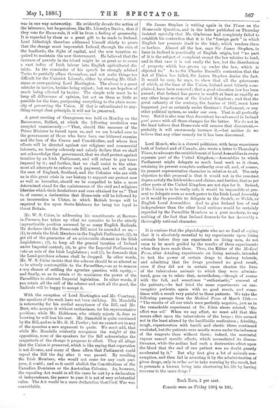It is curious that the physiologists who are so fond
of sayiug that it is absolutely essential to try experiments upon living animals before they can experiment on living men, do not seem to be much guided by the results of these experiments when they have made them. Thus, the Editor of the Medical Press, after detailing experiments on living animals, intended to test the power of certain drugs to destroy tubercle, and admitting that the drugs produced no good result, even if they did not in certain cases shorten the lives of the tuberculous animals to which they were adminis- tered, goes on to relate that, nevertheless,—though of course with the full, and sometimes " enthusiastic," consent of the patients,—he had tried the same experiments on con- sumptive patients, again with no good result, and some- times with a result very painful to these patients. We take the following passage from the Medical Press of March 17th :— " The results of all our trials were perfectly negative, just as in the remarkable experiment of Dr. Klein above related, ' the effect was nil.' When we say effect, we must add that this means effect upon the tuberculosis of the lungs ; this seemed not in the least altered by the baoillioidic medication ; febrility, cough, expectoration with bacilli and elastic fibres continued unabated, but the patients were mostly worse under the influence of the reagents than without them ; indeed, the mercurial, vapour caused specific effects, which necessitated its discona tinnance, while the aniline had such a destructive effect upon the blood that the end of one patient was no doubt greatly accelerated by it." But why first give a lot of animals con- sumption, and then fail in arresting it by the administration of given drugs, only in order not to take warning by the result, but to persuade a human being into shortening hie life by having recourse to the same drugs




































 Previous page
Previous page